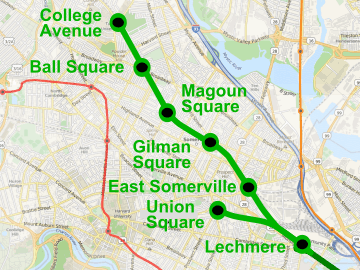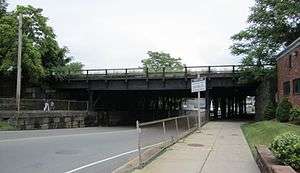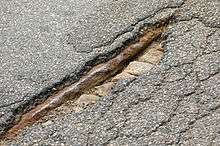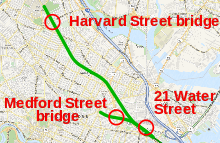Green Line Extension

The Green Line Extension (sometimes abbreviated as GLX) is an initiative to expand transit services in Greater Boston by extending the Massachusetts Bay Transportation Authority (MBTA) Green Line light rail beyond its current northern terminus at Lechmere Station in Cambridge, Massachusetts. The 4.3-mile (6.9 km) extension is intended in order to improve mobility and regional access for residents in the densely populated municipalities of Somerville and Medford, two cities currently underserved by the MBTA relative to their population densities, commercial importance, and proximity to Boston.
The project would provide Green Line service beyond a relocated Lechmere Station to College Avenue in Medford and to Union Square in Somerville using a two-branch operation, both to be operated within existing MBTA Commuter Rail rights-of-way. The extension is projected to have a total weekday ridership of about 52,000.[1] The Green Line would see an increase in boardings of 30,700, and the MBTA system would see between 7,000 and 8,000 new transit users.[1]
While on the drawing board since 1990, the project has proceeded in fits and starts. Construction finally broke ground on Phase 1 of the Green Line Extension in 2012,[2] with service targeted to begin in 2020.[3] In August 2015, the MBTA disclosed that the project would cost approximately $3 billion, a $1.08 billion increase from previous estimates. The revised cost called into question whether the project could be completed; options like scaling down stations or the maintenance facility will also be considered.[4] In December 2015, the MBTA ended its contracts with the project's general contractor, project manager, and designer, among others, and announced that while components of the project under construction would continue, no further work would be awarded or started;[5] however, in May 2016, a revised version of the project with lower projected construction costs was approved by MassDOT and the MBTA, and new construction will resume if the new plan is approved by the Federal Transit Administration (FTA).[6][7]
Route

The Green Line Extension is planned to have two branches, which will split just past a relocated Lechmere station in East Cambridge. The project’s two branches consist of:
- A main branch, 3.4-mile (5.5 km) long, to Medford within the existing Lowell Line commuter rail right-of-way with five stations and the terminus at College Avenue in Medford. The “Medford Branch” will become part of the "D" Branch, with intermediate stations located at Washington Street, Gilman Square, Lowell Street, and Ball Square.[8][9]
- A second branch, approximately 0.9-mile (1.4 km) long, to Union Square in Somerville. This branch would follow the existing Fitchburg Line commuter rail right-of-way and includes a single station at Union Square. The Union Square Branch will be designated as part of the "E" Branch.[8][9]
Additionally, the project will include acquisition of 24 new Green Line cars and construction of a support facility for storage and servicing of the fleet and existing north side Green Line operations.[10]
The original plans called for a further station, Route 16, at the Mystic Valley Parkway in West Medford, as well as an intermediate stop at Winthrop Street and Boston Avenue at the northern edge of the Tufts campus. The Winthrop Street stop was dropped from plans due to the proximity of other stations and neighborhood opposition, while the Route 16 station was placed on hold due to cost issues. In 2011, the Boston MPO decided to allocate funding in the 2016–2020 time period for the Route 16 station.[11][12]
History
Though the Tremont Street Subway was originally built to remove streetcars from the surface streets of downtown Boston, by the time of the Boylston Street Subway extension to Kenmore Square in 1914 provisions were made for the future conversions of the tunnel to use heavy rail metro rolling stock for faster service on suburban extensions. The Boston Division of Metropolitan Planning's 1926 Report on Improved Transportation Facilities further considered this conversion (and a connection to the East Boston Tunnel) as well as running rapid transit lines along existing mainline railroads to replace inner suburb local stops.[13]
The conversion proposal—which would have involved a continuous tunnel running from Lake Street station in Brighton to Maverick Square in East Boston, plus a second through route from Lechmere to Tremont Street in Roxbury—was never implemented except for the partial completion of the Huntington Avenue Subway in 1941. However, many of the other extension proposals were partially or wholly completed, with the opening of the Blue Line to Wonderland in 1954, the Highland Branch conversion to light rail in 1959, the partial conversion of the Reading Hill Line to the Haymarket North Extension in 1977, the extension of the Red Line to Braintree in 1980, and the relocation of the Orange Line to the Southwest Corridor in 1987. Two additional projects were considered in the report but not recommended for immediate work: a circumferential route which would reappear years later as the Urban Ring, and an extension of Tremont Street Subway through service from Lechmere to Woburn via the Lowell Line.[13]

By 1940, just four streetcar routes remained in Somerville: the 87 Clarendon Hill – Lechmere via Somerville Avenue and 88 Clarendon Hill – Lechmere via Highland Avenue pair, the 89 Clarendon Hill – Sullivan Square Station route, and the 101 Salem Street – Sullivan Square Station route which connected with the Eastern Massachusetts Street Railway's Fellsway Line to Stoneham. The 87 and 88 were converted to trackless trolleys in 1941, while the 89 and 101 saw heavy wartime use and lasted until 1946 and 1947, respectively.[14]
In the 1945–47 Coolidge Commission reports, many of the same transit projects were again proposed; but this time the Woburn extension was given a high rating.[13] The extension would allow the Boston & Maine Railroad to abandon their local stops along the corridor (all stops from West Medford inwards had previously lost most of their ridership to streetcars) while providing a faster trip than on surface transit.[15][16]
However, other extensions received priority, and the Woburn extension was not built. The B&M dropped the Somerville local stops in the late 1940s and early 1950s due to declining ridership. In 1955–57 the B&M raised the tracks through Wedgemere and Winchester Center onto a high grade and viaduct in order to eliminate busy grade crossings.[17] However, the elevated portion was only built with two tracks, preventing a rapid transit extension from reaching to Woburn, since two tracks would still be needed for Lowell Line service. All discussion of the project since has focused on an extension no further than West Medford. The trackless trolleys were replaced by buses in 1959 and 1963, leaving most of Somerville with a transit system dependent on buses running on frequently crowded streets.[18]
Original GLX project plan

After decades of no action, in 1990 Massachusetts agreed to a legally binding resolution to extend the line through Somerville to offset the additional burdens in traffic and pollution within the city due to completion of the Big Dig project. The current phase of planning began in 2005 with the completion of the MBTA's "Beyond Lechmere Northwest Corridor Study Major Investment Study/Alternatives Analysis."[19]
Despite this legal commitment, however, the Green Line Extension project lagged far behind schedule, prompting the City of Somerville and the Conservation Law Foundation to file a lawsuit to keep the project moving. In 2006, this litigation, with the help of community support and advocacy groups such as Somerville Transportation Equity Partnership (STEP) and the Union Square Task Force, finally brought about a multimillion-dollar state investment in planning for the Green Line Extension with mandated completion date of December 2014.[20] Potential station stops were announced for the first time in May 2008.[21]
In 2010, the Massachusetts Department of Transportation (MassDOT) announced that the new service was expected to be operational in October 2015; interim air quality offset measures would need to be taken if the project misses its December 2014 deadline as expected. The Department of Transportation had previously announced that due to budget limitations, the portion from College Avenue to Route 16 would be a future second phase of the extension, not included in the current proposed project.[22]
In August 2011, MassDOT announced that opening of the Extension would be postponed to Fall 2018 at the earliest. Completion of the Extension to College Avenue near Tufts University could be delayed to 2020, while the terminus at Mystic Valley Parkway remains deferred indefinitely. The stated reason for the delays was difficulties in land acquisition, as well as implied concerns about cost controls and financing.[23] Interim air-quality improvement measures will be necessary due to the project delays. Possibilities include extending Green Line branches to Lechmere, increased bus service in Somerville and Medford, and adding temporary or permanent commuter rail stops along the GLX corridor.[24]
On June 11, 2012, the Federal Transit Administration approved the Extensions for entry into the Preliminary Engineering phase as part of the New Starts program. This approval was a necessary step in MassDOT's application for $557 million in New Starts funding.[25]
In August 2012, the City of Somerville, MassDOT, and the MBTA reached a memorandum of agreement about the Union Square station. Through the Somerville Redevelopment Authority, the City will acquire $8 million worth of land for the station and grant the MBTA a permanent easement. In return, the MBTA and MassDOT will pay for cleanup costs at the site, begin construction by the spring of 2014 and open the station no later than early 2017.[26] In October 2012, the Somerville Board of Aldermen approved the Union Square Redevelopment Plan and authorized an $8 million bond, including $6 million to purchase the land and $2 million for cleanup and station planning.[27]
In December 2014, the FTA said it intended to pay $996 million of the extension's $2.2 billion costs. The remainder of expenses will be paid by the state, from either its operating funds or bonds.[28] On April 18, 2014, Governor Patrick signed a $12.7 billion bonding bill which included $1.3 billion for the Green Line Extension, as well as $2.3 billion for South Coast Rail and $325 million for South Station expansion.[29]
In August 2015, the MBTA disclosed that the project would cost approximately $3 billion, a $1.08 billion increase from previous estimates. The revised cost called into question whether the project could be completed; options like scaling down stations or the maintenance facility will also be considered.[4]
Phase 1 construction
Phase I consists of the reconstruction of the Harvard Street Railroad Bridge in Medford and the Medford Street Railroad Bridge in Somerville as well as the demolition of the MBTA facility at 21 Water Street in Cambridge. The MBTA opened bid solicitations for Phase I construction elements, which represent preliminary work that can be done while the main project is in final design, in July 2012. The work includes the $15.3 million reconstruction of the two railroad bridges, as well as the $3 million demolition.[30] Phase I work is to last until early 2015.[31]
A groundbreaking ceremony was held at the Medford Street bridge on December 11, 2012.[32] A Notice to Proceed was issued to the contractor, Barletta Heavy Division, Inc., on January 31, 2013. Surveying began in February, while construction started in March 2013.[33][34]
The 21 Water Street facility was demolished in August 2014.[35]
Phase 2/2A construction
In September 2013, the state secured funding to move forward on the construction of two new Green line stations in Somerville, project Phase 2/2A. Construction was expected to begin on two new stations in the Union Square and Brickbottom neighborhoods of Somerville early in 2014, but has not as of early 2016. A new elevated Lechmere and a viaduct over the Fitchburg Line will also be built, along with numerous streetscape, bridge, signal, and utility improvements and relocations.[31]
In mid-2013, the MBTA awarded a construction manager-general contractor contract to White Skanska Kiewit (WSK), a joint venture of J. F. White Contracting Co., Skanska USA Civil Northeast and Kiewit Infrastructure. WSK is responsible for the primary construction work for Phases 2/2A, 3, and 4. Notice to proceed for Phase 2 pre-construction was given on July 19, 2013.[36] On September 25, 2013, the MassDOT board approved a $393M, three-year contract with WSK for Phase 2 construction, with funds from the transportation bill passed earlier that year.[37] The state intends to seek $557M in federal New Starts money for Phases 3 and 4.[38]
Further phases
The main project is divided into three phases. Phase 2/2A, which was to be complete by early 2017, would extend service to Union Square on the Union Square Branch, and to Washington Street on the Medford Branch. A new elevated Lechmere station and a substantial viaduct over the Fitchburg Line would be built, along with numerous streetscape, bridge, signal and utility improvements and relocations.[31] Phase 3, involves the construction of a substantial new Green Line maintenance facility and several smaller buildings adjacent to the MBTA Commuter Rail Maintenance Facility. Phase 4, is the construction of the remainder of the Medford Branch, with stations at Gilman Square, Lowell Street, Ball Square, and College Avenue. Several miles of Lowell Line tracks will be relocated and retaining and noise abatement walls constructed to make way for the Green Line tracks, as well as more bridge, signal, and utility work.[31]
Revised GLX Project plan
On Monday, May 9, 2016, the GLX Interim Project Management Team submitted a report outlining a redesigned project to the MassDOT Board of Directors and the MBTA Fiscal & Management Control Board, which then voted to ‘support advancing the Green Line Extension Project (“GLX Project”) and [seek] Federal Transit Administration (“FTA”) review and approval of the redesigned GLX Project'.[6]
The first step will be resubmitting the revised plan to the FTA for approval. If approved the remaining work will be reprocured using the Design-Build project delivery method, a process expected to take 18 months if done on an expedited basis. Construction would then take between 43 and 47 months.
To achieve needed cost savings a number of elements of the project were simplified or dropped. Stations will have open platforms with several shelters, similar to the Riverside Line. Amenities such as escalators, redundant elevators, fare gates, personnel rooms, toilets, extra structure for The RIDE drop-offs, and canopies were eliminated at most stations. Bike storage will still be provided at all stations. The Vehicle Maintenance Facility will be reduced by roughly half, with storage for 44 Green Line vehicles instead of 88 in the previous design. Three bridges, at Lowell, Medford and School Streets, that were to be replaced will be retained, with the westbound GLX track tunneling behind abutments. The College Avenue Bridge will not be widened. The Broadway Bridge project was simplified and the bridge will be fully closed during reconstruction.
The community path that would extend the Somerville Community Path will not be incorporated in the viaduct that will be built on the southern portion of the project. The community path will now terminate at Washington Street, Somerville instead of Water Street in Cambridge. The new path design shifts from the west side of the track to the east side and then back again between Central Street and School Street and has fewer entrances from cross streets. South of Washington Street, bike commuters would have to use city streets, including the McGrath Highway, to reach the Charles River bike path network and downtown Boston.[7]
Criticism
Terminus location
In 2008, the EPA ratified the Massachusetts State Implementation Plan (SIP) to include an amendment to the 1994 agreement that substituted the planned "the Green Line extension to Ball Square/Tufts University" with an "extension to Medford Hillside...[and] spur to Union Square."[39] Accordingly, the MBTA and MassDOT surveyed potential termini at the intersection of Winthrop Street and Boston Avenue, and also at Route 16 (Mystic Valley Parkway), but these locations were abandoned by the agencies, citing budgetary limitations. Instead, the Green Line Extension was retracted by a mile to College Avenue, which is encompassed by Tufts University.[40]
The plan to terminate the GLX at College Avenue drew criticism from residents in Medford and Somerville, who questioned the advantages and legality of the move.[41] A petition by the Medford Green Line Neighborhood Alliance to extend the Green Line argued that a Route 16 terminus would "provide Green Line access to thousands of people within a 10-minute walk," be "conveniently located on two major thoroughfares with existing bus connections," and "serve two large portions of Medford and Somerville designated as Environmental Justice Communities."[42]
In January 2012, the MBTA and MassDOT issued a response to questions from the public. The document stated that "the position of MassDOT and the MBTA on the configuration of the Green Line Extension is supported and has been reinforced by multiple regulatory agencies overseeing the SIP, including MassDEP." In concluding these comments, the MBTA stated that it would not respond to any further questions regarding College Avenue satisfying the Medford Hillside requirements of the SIP.[43]
Lechmere closure
During Phase 2 construction, the northern section of the Lechmere Elevated will be removed and the elevated section of the line will be extended to a large flyover bridge crossing the Fitchburg Line tracks. The 1922 Lechmere station will be replaced with an elevated station across the street. The work may require closing the viaduct (and thus cutting service back to North Station) for 17 months—the third major disruption of Lechmere service since 2004—causing opposition to the closure in Cambridge.[44]
References
- 1 2 Bowles, Ian (July 30, 2010). "Final Environmental Impact Report" (PDF). p. 5. Retrieved October 16, 2010.
- ↑ Rosenberg, Steven A. (December 5, 2013). "Somerville poised to grow along Green Line". The Boston Globe. Retrieved December 7, 2013.
- ↑ http://www.wbur.org/2014/09/13/green-line-extension-cost-rises-to-2-billion
- 1 2 Dungca, Nicole (August 24, 2015). "Green Line extension could cost another $1 billion". The Boston Globe. Retrieved 26 August 2015.
- ↑ "MBTA ends contracts with firms working on Green Line extension". Boston Herald. December 10, 2015. Retrieved 11 December 2015.
- 1 2 Green Line Extension Review Interim Project Management Team Final Report presentation, May 9, 2016
- 1 2 Report to the MBTA Fiscal and Management Control Board and the MassDOT Board of Directors, Green Line Extension Project Interim Project Management Team, submitted May 9, 2016
- 1 2 "MBTA Light Rail Transit System OPERATIONS AND MAINTENANCE PLAN" (PDF). Massachusetts Bay Transportation Authority. 6 January 2011. Retrieved 10 August 2015.
- 1 2 "Travel Forecasts: Systemwide Stats and SUMMIT Results" (PDF). Green Line Extension Project: FY 2012 New Starts Submittal. Massachusetts Department of Transportation. January 2012. Retrieved 10 August 2015.
- ↑ Ainsley, Mary; Fichter, Katherine (August 25, 2011). "Green Line Extension Project: Project Management Plan - Preliminary Engineering Phase" (PDF). greenlineextension.eot.state.ma.us. Massachusetts Bay Transit Authority & Massachusetts Department of Transportation. Retrieved December 11, 2013.
- ↑ http://www.somervillestep.org/2011/06/green_line_rout.html
- ↑ http://www.ctps.org/Drupal/data/pdf/plans/LRTP/paths/2035_LRTP_Amendment_Three_072214.pdf
- 1 2 3 Central Transportation Planning Staff (15 November 1993). "The Transportation Plan for the Boston Region - Volume 2". National Transportation Library. Retrieved 24 January 2013.
- ↑ Clarke, Bradley H. (2003). Streetcar Lines of the Hub - The 1940s. Boston Street Railway Association. pp. 132–149. ISBN 0938315056.
- ↑ Boston Elevated Railway and Boston Department of Public Utilities (1945). "Boston Rapid Transit System & Proposed Extentions 1945 - Metropolitan Transit Recess Commission Air View". Wardmaps LLC. Retrieved January 24, 2013.
- ↑ Metropolitan Transit Recess Commission (1945). "Proposed Rapid Transit Route: Lechmere to Woburn". Report of the Legislative Commission on Rapid Transit: 1945. Retrieved July 29, 2013.
- ↑ Humphrey, Thomas J.; Clark, Norton D. (1985). Boston's Commuter Rail: The First 150 Years. Boston Street Railway Association. pp. 55–57. ISBN 9780685412947.
- ↑ Belcher, Jonathan (March 23, 2013). "Changes to Transit Service in the MBTA district" (PDF). NETransit. Retrieved September 17, 2013.
- ↑ "Green Line Extension Info". City Of Somerville. Retrieved August 26, 2007.
- ↑ Cummings, Claire (August 9, 2007). "Proponents rap delay to extend Green Line". The Boston Globe. Retrieved August 26, 2007.
- ↑ Ryan, Andrew (May 7, 2008). "Potential Green Line stops announced in Somerville, Medford". The Boston Globe. Retrieved December 11, 2012.
- ↑ Alix, Roy (June 21, 2010). "Latest plan has Green Line ending at College Avenue". The Boston Globe. Retrieved July 10, 2010.
- ↑ Byrne, Matt (August 1, 2011). "State: Green Line extension will be delayed til 2018". The Boston Globe. Retrieved August 1, 2011.
- ↑ Central Transportation Planning Staff (January 23, 2012). "Green Line Extension SIP Mitigation Inventory" (PDF). Massachusetts Department of Transportation. Retrieved June 26, 2012.
- ↑ Mello, Mary Beth (June 11, 2012). "Re: Preliminary Engineering Approval for the Green Line Extension (GLX) Light Rail Transit Project" (PDF). Federal Transit Administration. Retrieved June 26, 2012.
- ↑ Orchard, Chris (August 3, 2012). "Agreement Says Union Square Green Line Station Operational by 2017". Somerville Patch. Retrieved August 4, 2012.
- ↑ Orchard, Chris (October 12, 2012). "Aldermen Authorize $8 Million Bond for Union Square Green Line Site". Somerville Patch. Retrieved October 21, 2012.
- ↑ Annear, Steve (December 2, 2014). "Government Will Pay for Nearly Half of the MBTA's Green Line Extension Project". Boston Magazine. Retrieved December 3, 2014.
- ↑ "Transportation Bond Bill Update - Bill signed by Governor". The American Council of Engineering Companies of Massachusetts (ACEC/MA). 18 April 2014. Retrieved 28 July 2015.
- ↑ "Bids sought for initial Green Line Extension work". Medford Green Line neighborhood Alliance. July 16, 2012. Retrieved July 17, 2012.
- 1 2 3 4 "Green Line Extension Project: Fall 2012 Fact Sheet" (PDF). Massachusetts Department of Transportation. November 5, 2012. Retrieved July 29, 2013.
- ↑ "Green Line Extension Phase 1 Construction Begins". Commonwealth Conversation: Transportation. Massachusetts Department of Transportation. December 11, 2012. Retrieved December 15, 2012.
- ↑ Sheeran, Elizabeth (February 8, 2013). "Notice to Proceed Given For Phase 1 of Green Line Extension". Ward 5 Online. Retrieved February 8, 2013.
- ↑ "MBTA gets set to lay tracks". The Somerville News. March 20, 2013. Retrieved March 20, 2013.
- ↑ MassDOT (25 August 2014). "2014_08_25 MBTA Building at 21 Water St in Cambridge Demolition_2". Green Line Extension Phase 1. Retrieved 25 August 2014.
- ↑ Orchard, Chris (July 29, 2013). "Construction Firm Hired for Green Line Extension". Somerville Patch. Retrieved July 29, 2013.
- ↑ "State approves $393m for three new stations on Green Line". The Boston Globe. September 26, 2013. Retrieved September 26, 2013.
- ↑ Orchard, Chris (September 25, 2013). "$393 Million Approved to Bring Green Line to Union Square, Washington Street". Somerville Patch. Retrieved September 26, 2013.
- ↑ "Approval and Promulgation of Air Quality Implementation Plans; Massachusetts; Amendment to Massachusetts' State Implementation Plan for Transit System Improvements" (PDF). Federal Register, Vol. 73, No. 148, p. 44655. July 31, 2008. Retrieved August 11, 2013.
- ↑ Fichter, Katherine S. (January 10, 2012). "Responses to Comments on the October 2011 Environmental Assessment" (PDF). Retrieved August 11, 2013.
- ↑ http://greenlineextension.eot.state.ma.us/documents/FinalEIR/GLX_mtg20063010.pdf
- ↑ "Bring the Green Line to Route 16". Medford Green Line Neighborhood Alliance. Retrieved August 11, 2013.
- ↑ "Responses to Comments on the October 2011 Environmental Assessment," p. 6.
- ↑ Levy, Marc (February 26, 2014). "Second 17-month T disruption looms for Lechmere; public market idea still alive". Cambridge Day. Retrieved May 2, 2014.
External links
| Wikimedia Commons has media related to Green Line Extension (MBTA). |
Official sites
- MassDOT project page
- MBTA project page
- 2014 animation of Medford Branch
- 2014 animation of Union Square Branch